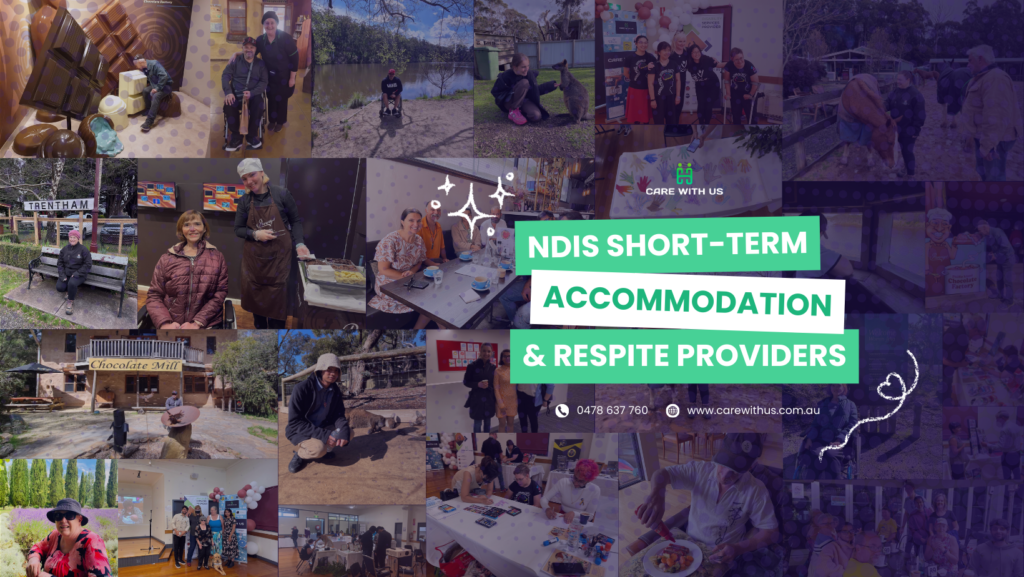NDIS Respite Care Equipment and Aids: An Overview
The NDIS Respite Care equipment and aids are necessary for the carer and the participant. It provides advice and information that tends to make caregiving safer and more doable.
The goals of the NDIS program include offering simple prerequisites that assist in the care of independent caregivers while also lowering health risk factors/decreasing health-related job woes/ enhancing workplace experience by offering mobility-enhancing gadgets, medical mattresses, and other relevant tools such as wheelchairs, beds, and the like.
These tools are funded under NDIS and the design of these tools is such that they can be in complete harmony with the disabled people so that the type of disability, age and the level of independence are also well thought out.

Essential Equipment and Aids for Elderly Respite Care under NDIS
Respite care for the elderly clients usually involves various aids and devices which enhance their quality of life and enable them to be as independent as possible. These devices also assist caregivers in performing certain hard duties.Some essential equipments and aids that can be funded by the NDIS are:
- Mobility aids including but not limited to walkers, crutches, wheelchairs and transfer belts.
- Bathroom safety products including but not limited to grab bars, shower chairs, and raised toilet seats.
- Daily living aids help with eating, dressing, and personal grooming.
These aids enable mobility and safety for elderly participants during respite care but also ease the burden of caregiving during such periods.
Equipment and Aids for Disabled Adults in NDIS Respite Care
NDIS Respite Care Equipment and Aids for disabled adults often need specialised equipment that is suited to different physical and cognitive needs. NDIS offers funds for equipment that enhance mobility, communication and general independence.
The primary examples include:
- Posture control devices, adaptive seating and standing frames.
- Speech generating devices and hearing aids.
- Environmental controls such as lighting control or modified door access that allows the participant to operate different aspects of their environment.
These aids all support disabled adults to be able to participate more actively in activities of daily living, whether at home or in the community.
What Types of Equipment Does NDIS Fund for Respite Care?
What equipment will NDIS fund? NDIS provides funding for items and services which contribute directly to the participants’ day to day activities and their safety.
Assistive technology
This refers to the category of equipment that is used for the performance of manual chores, such as moving around, taking a bath, speaking, and engaging in other modes of play.
Home modifications
House alterations made to one’s residence for the purpose of enhancing mobility, for instance placing a grab bar in the shower.
Specialist Disability Accommodation (SDA)
Accommodation for individuals with certain disabilities where the level of functional impairment is extreme or the needs very high
Examples of Assistive Equipment in Respite Care
What is an example of assistive equipment?
Assistive equipment in respite care helps an individual in the execution of activities of daily living more easily or independently.
Some examples are:
- Wheelchairs and mobility scooters – are helpful for participants enabling them to roam about without depending on others.
- Bathroom grab bars and shower chairs – Help individuals in keeping their balance and preventing fall.
- Communication aids -Aided communication devices help such participants to share information with caregivers and relatives in a better way.
These examples offer assistance to the patients making it possible for them to be independent and more secured in the course of care sessions.
Three Key Pieces of Equipment Commonly Used in Care Support
The following are three good and useful devices that are often used in the provision of care services:
- Transfer boards: These devices enable the caregivers to assist the participants go from the bed to the wheelchair or the shower without too much strain.
- Pressure relief cushions: These cushions provide comfort and even relief from sores for participants who are seated for long periods of time.
- Electric hospital beds: These beds provide adjustable angles to the patients in order to provide comfort and facilitate caregiving.
These devices are essential in ensuring that safe, warm and conducive care settings are achieved.
Selecting the Right Equipment and Aids for NDIS Respite Care
Choosing the appropriate equipment for the NDIS respite care depends on the needs, mobility and personal preferences of the individual. It is advisable to get an occupational therapist or a care coordinator who can suggest those aspects based on the participant’s typical daily activities, height and weight and residing accommodation.
How to Choose Suitable Equipment Based on Individual Needs
When selecting equipment that is funded by NDIS, please consider the following:
- Functionality: Make certain that the piece of equipment solves a real problem or limitation.
- Simplicity of use: Consider purchasing devices that are easy to use and handle.
- Safety: Consider ordering aids that are of high quality and sturdiness, and which provide enhanced protection to the participant and the caregiver as well.
Appropriate equipment selection may improve the provision and the quality of respite care significantly.
FAQ
Yes, NDIS also provides equipment for elderly people such as mobility aids, bathroom support, hospital beds, etc.
NDIS provides mobility aids, communication devices and other assistive devices known as aids of daily living.
Please contact your NDIS planner or support coordinator to request that assistive devices be added to your plan
Eligibility depends upon personal circumstances and their impact on daily tasks. An NDIS assessor may evaluate your situation to determine the appropriate aids and devices.
